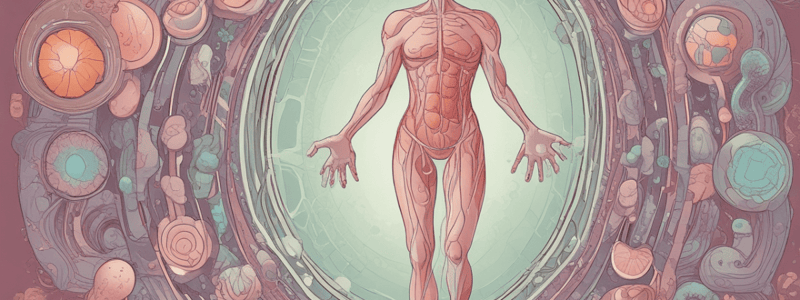Podcast
Questions and Answers
Which is a clinical feature of hypogonadism before puberty?
Which is a clinical feature of hypogonadism before puberty?
- High-pitched voice
- Ambiguous genitalia
- Skeletal abnormalities (correct)
- Soft and mushy testicles
Which of the following is NOT a cause of hypogonadism?
Which of the following is NOT a cause of hypogonadism?
- Trauma
- Irradiation
- Excessive exercise (correct)
- Chromosomal abnormalities
What indicates gonadal dysfunction?
What indicates gonadal dysfunction?
- Low testosterone with high gonadotrophins (correct)
- High testosterone with high gonadotrophins
- Normal testosterone with low gonadotrophins
- Low testosterone with low gonadotrophins
What is a possible outcome of androgen insensitivity states?
What is a possible outcome of androgen insensitivity states?
What test is most important for diagnosing hypogonadism?
What test is most important for diagnosing hypogonadism?
Which of the following is a characteristic feature of Klinefelter's syndrome?
Which of the following is a characteristic feature of Klinefelter's syndrome?
What age defines early sexual development in terms of sexual precocity?
What age defines early sexual development in terms of sexual precocity?
Which of the following is NOT a gonadotrophin-independent cause of virilisation?
Which of the following is NOT a gonadotrophin-independent cause of virilisation?
In the GnRH stimulation test, what is the expected normal response for LH?
In the GnRH stimulation test, what is the expected normal response for LH?
What therapy is used for Klinefelter's syndrome?
What therapy is used for Klinefelter's syndrome?
Which of the following is a cause of precocious puberty?
Which of the following is a cause of precocious puberty?
Turner’s syndrome is characterized by which karyotype?
Turner’s syndrome is characterized by which karyotype?
What is the prevalence of Turner’s syndrome?
What is the prevalence of Turner’s syndrome?
Which clinical feature is associated with Testicular Feminisation (AIS)?
Which clinical feature is associated with Testicular Feminisation (AIS)?
What is the approximate prevalence of Testicular Feminisation (AIS) in live births?
What is the approximate prevalence of Testicular Feminisation (AIS) in live births?
Which of the following is a test used to assess female reproductive function?
Which of the following is a test used to assess female reproductive function?
Which condition is NOT a pituitary or hypothalamic cause of abnormal menstruation and infertility?
Which condition is NOT a pituitary or hypothalamic cause of abnormal menstruation and infertility?
Which of the following is NOT related to precocious puberty?
Which of the following is NOT related to precocious puberty?
Which hormone is primarily responsible for the deepening of the voice in males?
Which hormone is primarily responsible for the deepening of the voice in males?
Which gland in the male reproductive system is responsible for secreting testosterone?
Which gland in the male reproductive system is responsible for secreting testosterone?
Which cells in the testes are directly responsible for the production of sperm?
Which cells in the testes are directly responsible for the production of sperm?
Which of the following is NOT a function of testosterone?
Which of the following is NOT a function of testosterone?
The negative feedback mechanism in male hormonal control involves which of the following hormones?
The negative feedback mechanism in male hormonal control involves which of the following hormones?
Which of the following is a possible clinical presentation of male gonadal dysfunction in adult males?
Which of the following is a possible clinical presentation of male gonadal dysfunction in adult males?
What are Leydig cells primarily responsible for?
What are Leydig cells primarily responsible for?
Which structure in the male reproductive system is responsible for storing and maturing sperm cells?
Which structure in the male reproductive system is responsible for storing and maturing sperm cells?
Which clinical feature is associated with Polycystic Ovary Syndrome (PCOS)?
Which clinical feature is associated with Polycystic Ovary Syndrome (PCOS)?
What is a diagnostic criteria for PCOS?
What is a diagnostic criteria for PCOS?
What can result from an androgen secreting tumour?
What can result from an androgen secreting tumour?
What condition is associated with high plasma 17 hydroxy progesterone levels?
What condition is associated with high plasma 17 hydroxy progesterone levels?
Which of the following is characteristic of hypothalamic (secondary) amenorrhoea?
Which of the following is characteristic of hypothalamic (secondary) amenorrhoea?
Which feature is commonly seen in virgins and is associated with male secondary sexual characteristics?
Which feature is commonly seen in virgins and is associated with male secondary sexual characteristics?
Which condition is part of secondary ovarian failure?
Which condition is part of secondary ovarian failure?
What is a treatment for congenital adrenal hyperplasia (CAH)?
What is a treatment for congenital adrenal hyperplasia (CAH)?
Which hormone is responsible for stimulating follicular growth in the ovaries?
Which hormone is responsible for stimulating follicular growth in the ovaries?
What condition is characterized by the presence of multiple cysts in the ovaries?
What condition is characterized by the presence of multiple cysts in the ovaries?
What hormone results in the formation of a corpus luteum?
What hormone results in the formation of a corpus luteum?
Which of the following is a clinical presentation of female gonadal dysfunction?
Which of the following is a clinical presentation of female gonadal dysfunction?
Which hormone inhibits FSH and LH for most of the menstrual cycle?
Which hormone inhibits FSH and LH for most of the menstrual cycle?
Which clinical presentation is associated with excessive male-pattern hair growth in females?
Which clinical presentation is associated with excessive male-pattern hair growth in females?
What role does progesterone play in the female reproductive system?
What role does progesterone play in the female reproductive system?
Which of the following is NOT a disorder associated with female gonadal dysfunction?
Which of the following is NOT a disorder associated with female gonadal dysfunction?
Flashcards are hidden until you start studying
Study Notes
Male Gonadal Hormone
Testosterone Functions
- Embryologic male genital differentiation
- Maturation of the external genitals
- Skeletal muscle growth
- Deepening of the voice
- Epiphyseal cartilage growth during puberty
- Male hair growth and distribution
- Stimulation of sebaceous glands
- Male social behavior, libido
Testes
- Components:
- Prostate gland
- Urethra
- Erectile tissue
- Prepuce
- Glans penis
- Seminiferous tubules
- Testis
- Head of epididymis
- Tail of epididymis
- Urinary bladder
- Ampulla
- Seminal vesicle
- Ejaculatory duct
- Bulbourethral gland
- Vas deferens
- Epididymis
- Scrotum
- Leydig cells (interstitial cells)
- Sertoli cells
- Spermatogonium
- Spermatids
- Spermatozoa
- Primary spermatocyte
- Secondary spermatocyte
Male Sexual Function
Hormonal Control in the Male
- Integration of metabolic signals
- Higher centers:
- Hypothalamus
- GnRH
- Pituitary
- LH, FSH
- Testes
- Spermatogenesis
- Leydig cell function
- Hypothalamus
- Neuronal input
- Negative feedback (positive feedback)
- Testosterone, inhibin
Puberty
- LH, FSH
- Testosterone
The 'Andropause'
Male Gonadal Dysfunction
- Causes:
- Hypothalamic origin
- Pituitary origin
- Testicular origin
- Clinical Presentation in Adult Males:
- Infertility
- Erectile dysfunction
- Loss of libido
- Gynaecomastia
- Common problems:
- Chronic renal failure
- Orchitis
- Drugs
- Cancer of the testis
Male Hypogonadism
Clinical Features
- Depends on the age of onset
- Hypogonadism in the second to third month of fetal life results in ambiguous genitalia
- Hypogonadism before puberty results in failure of secondary sexual development
- Psychological effects:
- Decreased aggression
- Decreased activity
- Decreased cognition
- Decreased emotion
- Decreased libido and impotence
- Defective spermatogenesis (low intratesticular testosterone)
- Decreased muscle mass with diminished muscle strength and endurance
- High-pitched voice due to the failure of thickening and maturation of the vocal cords
- Infantile genitalia
Causes
- Trauma (and surgery)
- Irradiation
- Drugs (alkylating agents, antiandrogens, spironolactone)
- Infection (viral, Syphilis, Leprosy, TB)
- Inflammation (autoimmunity)
- Infiltration (sarcoidosis, haemochromatosis)
- Chromosomal abnormalities
- Undescended testes and Varicocele
- Systemic illness, paraplegia, renal failure, and hepatic cirrhosis
Diagnosis
- Most important tests:
- Serum testosterone
- FSH
- LH
- SHBG
- Serum prolactin and estradiol levels may be useful
- Patterns:
- Low testosterone with high gonadotrophins indicate gonadal dysfunction
- Low testosterone with low gonadotrophins indicate pituitary/hypothalamic dysfunction
- Hyperprolactinaemia may result in the suppression of testosterone secretion
Sexual Precocity
- Early sexual development before age 9 years caused by high androgens
- Virilisation without spermatogenesis
- Gonadotrophin-independent:
- Leydig cell tumour or hyperplasia
- CAH
- Adrenal tumour
- Androgen administration
- Gonadotrophin-dependent:
- Idiopathic
- HCG secreting tumours
- CNS disorders
- Tumours
- Infections
- Injuries
Test of Pituitary Function
- Intravenous injection of 100ug GnRH
- LH and FSH measured at 15, 30, 45, and 60 minutes post-injection
- Normal response:
- Maximum LH of 2.5 times the basal level
- Maximum FSH of 2 times the basal level
Gonadotrophin Releasing Hormone
- Stimulates secretion of LH and FSH
Klinefelter's Syndrome
Clinical Features
- Feminine body habitus
- Lack of body hair
- Gynaecomastia
- Long arms
- Sparse pubic hair
- Small testicles
- Tall stature, long legs
Causes
- Presence of an extra X chromosome, resulting in a 47XXY karyotype instead of the normal male karyotype (46XY)
Treatment
- Therapy consists of androgen replacement
Diagnosis
- Elevated levels of gonadotrophins
- Reduced serum testosterone
- Buccal Smear
- Karyotyping may be done on bone marrow, amniotic fluid, foetal cells, skin, solid tumours, or blood lymphocytes
Precocious Puberty
- Early development of secondary sexual characteristics and menstrual cycle
- Causes:
- Idiopathic
- Brain disorders (tumors and infections)
- Ovarian (cysts and tumors)
- Adrenarche: age 9-10 years
- Thelarche (breast development)
- Menarche: by age 15 years (95% of girls)
Chromosomal Disorders
Turner's Syndrome
- Karyotype: 45 (XO)
- Incidence: 1:2500-3000
- Features:
- Lymphoedema
- Short stature
- Hypogonadism
- Low-set ears
- Webbed neck
- Skeletal abnormalities
- Heart murmur
Testicular Feminisation (AIS)
- XY chromosome (male genotype), androgen insensitivity syndrome (AIS)
- Causes:
- Various genetic mutations on the X chromosome
- 1 in 20,000 live births
- Types:
- Complete AIS: female phenotype
- Incomplete AIS: varying degree of sexual ambiguity
Tests for Female Reproductive Function
- Gonadotrophins: LH and FSH
- Oestradiol
- Progesterone
- Prolactin
- Human Chorionic Gonadotrophins
- Androgens:
- Testosterone
- Androstenedione
- Dehydroepiandrosterone (DHEA and DHEAS)
- 17 hydroxyprogesterone
- Sex Hormone Binding Globulin (SHBG)
- Thyroid (T4, TSH); Cortisol; Growth Hormone
Polycystic Ovary Syndrome (PCOS)
Clinical Features
- Polycystic ovary syndrome
- Bitemporal hair loss
- Acanthosis nigricans
- Hirsutism
- Multiple cysts in the ovary
- Irregular menstrual cycle
- Acne
- Hirsutism
- Obesity
Diagnosis
- Clinical features
- Ultrasound scan
- Low SHBG
- High LH, low FSH
- High serum testosterone/FAI (free androgen index)
- High prolactin (will block the effect of LH & FSH on ovary)
Secondary Amenorrhoea (non-pregnant)
Primary Ovarian Failure
- Premature menopause
- Radiation/chemotherapy
- Post-infection
Secondary Ovarian Failure
- Hypothalamic/pituitary tumours
- Functional disorders
- Weight loss/anorexia nervosa
- Exercise
- Psychogenic
- General illness
Genital Tract Disorders
- Polycystic Ovary Syndrome
Ovarian Tumours
- Oestrogen or androgen-producing tumours (very rare)
Virilism and Hirsutism
- Virilism: female disorder involving development of male secondary sexual characteristics
- Hirsutism: common female complaint characterised by increased body hair with male pattern distribution
- Causes:
- Androgen secreting tumour
- Congenital Adrenal Hyperplasia (CAH)
- Drugs
- PCOS
Primary Amenorrhoea
Normogonadotrophic (normal LH and FSH)
- Anatomic defects
- Congenital adrenal hyperplasia (CAH)
Hypogonadotrophic (low LH and FSH)
- Hypopituitarism/hypothalamic disease
- Chronic illness
- Psychogenic
- Congenital syndromes (e.g., Prader Willi and Laurence Moon Biedl)
Hypergonadotrophic (raised LH and FSH)
- Turner's syndrome
- Gonadal irradiation/chemotherapy
- Androgen insensitivity syndrome 46 XY karyotype
- Congen
Studying That Suits You
Use AI to generate personalized quizzes and flashcards to suit your learning preferences.




